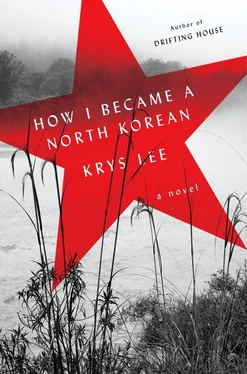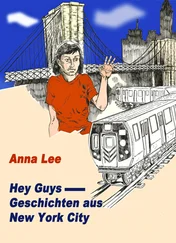I thought, finally, I was meeting God.
Before I saw the man, I saw his feet. His black shoes, laced so tightly they looked as if they were about to snap, stepped through the hole that was my door. Next his black suit that made him look like a typical gray-haired businessman, then his round face as serious as the Bible and so unlined that he must have never smiled or frowned. He walked steadily, even with the rusted wires shooting up from the floor, as if he was the kind of man for whom there were no obstacles, only a destination.
“Is anyone there?” he called out in Korean.
I recalled my mother’s warnings about organ thieves thirsty for my juicy liver or kidneys and Chinese mafia that carved out a person’s lungs for the fun of it. He might be a Joseon- jok like me, maybe one who sold boys into some seedy industry. I scrambled to get away, but my leg caught in my plastic wrap. His eyes focused on me as I heaved up again, praying for the superhuman strength of action-movie heroes, but I fell forward, more Marx Brothers than Superman. I probably would’ve broken my nose and more if the man hadn’t caught me in his arms. He did so gingerly, as if he disliked intimacy.
I flung myself backward and in a flash I had my slingshot and polished stones ready.
“Don’t be afraid,” he said. “I’m not a bad person.”
I kept quiet. He pulled away the rest of the plastic until it surrounded me like wilted flower petals, and I was inches away from his pencil-sharpened eyebrows. His hair, his pupils, and the shadow above his lips were the color of ash. His eyes flashed across me while I considered whether it was sinful to slam him in the groin and run. He looked puzzled, and disappointed, and he repeated what he had just said in Chinese.
That I couldn’t abide. I didn’t appreciate being mistaken for one of the Han people, and told him as much in Korean.
“A Joseon- jok. ” He said it in Korean this time. “What are you doing here, then? Where are your parents? I could’ve been someone you wouldn’t want to see.”
“I don’t know where my parents are.” I didn’t see it as a lie, not exactly. Burdened with a distant father and a mother who had gutted the core of the seventh commandment, I viewed myself as a kind of Christian orphan.
His bland expression softened. “My own parents were killed by the Japanese in the war. I was young, too, but the church took care of me. You shouldn’t be out alone like this. There are organizations for orphans and other kids like you.”
I was pretty sure that those organizations would lead me right back to the deacon and my mom.
“I don’t like institutions.”
He sighed. “Many of you don’t. You don’t live here like this all the time, do you? You’ll get pneumonia.”
I said nothing.
He assessed my clothes, my bag, the corner I had scouted for myself. He put his hands together as if in prayer.
“All Christians are friends,” he said.
I reached up for the cross that was now protruding over my shirt collar.
“Can I bring you food, a blanket? Help you in any way?”
“I have friends. They’re coming for me.”
He had an impassive face, like a rocky cliff, and I could only guess at his intentions until he drew out a piece of paper and scrawled a basic map and the name of a restaurant on it.
“I often eat here,” he said. “She’s a good woman. Whenever you need something — anything — ask for me. You can call me Kwon ajeoshi .”
• • •
That early spring evening as I was leaving work, two men pulled me into the shadows of an alley. I tried to break away, but they slammed me against the brick wall. It happened so quickly that the shock only hit me when an arm jabbed into my chest.
“Hand over your bag,” said the man with a bald spot exposed like a medieval tonsure. He was a Han Chinese and blew out cold puffs of air as he spoke.
“Here’s my wallet and my watch.” I offered up my wrist. My passport, which I considered my life, was tucked into the bag’s deepest compartment.
“I said your bag.” The man straightened, his voice louder. “You think I’m asking?”
I fumbled with the backpack, but I finally managed to get it open. “You’ll see that most of what’s in there is of no value to anyone but me.”
“You think I’m joking, kid?”
I shook my head.
That was when the tonsured man flipped open a jackknife and twirled it until it sliced through the air and rested against my Adam’s apple. Within seconds, the two of them stripped me of my possessions, taking even my waterproof boots. The knife stayed by my neck, and it sparked the same strong desire to live that I’d felt when I’d nearly drowned. I was fearful, my heart and head racing at the prick of the cold blade, when the sound of glass cracked behind me and someone shouted in warning. The criminals turned and ran deep into the alley.
Apparently I had been rescued. I slumped against the wall, weak and grateful and ashamed. Rescue reminded me of desperate maidens stuck in towers and sleeping beauties stretched out on beds of vermilion roses, waiting for their prince. Nothing made me more uncomfortable. I wanted to be the kind who did the rescuing.
I was also strangely at ease. The tall one with grave looks and a pensive droop to the corners of his eyes approached me under the streetlight, calming the breakneck speed of my heart. He shouldn’t have; he was clenching the neck of a soda bottle, an image incongruous with his fair, Asian pear skin and out-of-focus features. I had never seen such a beautiful man. He set the bottle down before facing me.
“Are you all right?” he said with such concern that I pretended that I was better than I felt.
“They took my bag, they took everything.”
I had lost my passport, my identification cards, my tools, everything except the cash tucked into my underwear and the inner lining of my pants. Daniel Daehan Lee, a citizen of the People’s Republic of China and a permanent resident of the United States of America, was now paperless, undocumented, as if I had never existed. I rubbed where the cold knife had pressed against my skin, feeling strangely free.
“Look, hyeong, they even took his shoes,” said the other, much smaller kid, sounding impressed. His cap was pulled down low over his face, and his voice crackled with the same awkward change I had suffered a few years ago.
The young man I’d call Yongju considered me, then told me to lift up my foot. I did as he said. He ripped his scarf in half with one great pelican motion of his long arms, then wrapped the two halves around my feet.
I didn’t know what to say. It was April and still chilly, and it was clear from their straggly hair and pants stiff with dried mud that they didn’t have many choices, though maybe I didn’t look so different from them by then. Yongju’s slender neck was now exposed. And still he had given me his scarf, he had risked himself for a stranger.
“That’ll do for now,” he said. “You’ll have to find a pair—”
“Or steal one later,” said the smaller kid.
We mutually assessed the situation. The soft modulation of Yongju’s voice and the draping of his hands made me long for those mysterious friendships that I’d watched from the sidelines back in America.
“You have anywhere to go?” Yongju finally asked.
“Not really.” I found myself whispering though the city had long shut down, and at its fringes, where we were, there was no one else in sight.
“You wouldn’t like where we are.” He jerked his head toward the mountains. “It’s primitive. And far.”
“You’re a Joseon- jok, aren’t you?” The smaller one I’d learn was Cheolmin lifted up his cap to have a closer look at me. I saw that part of his forehead and cheeks had been burned, giving his skin an uneven, blistered texture. His inflamed gums showed when he smiled.
Читать дальше












